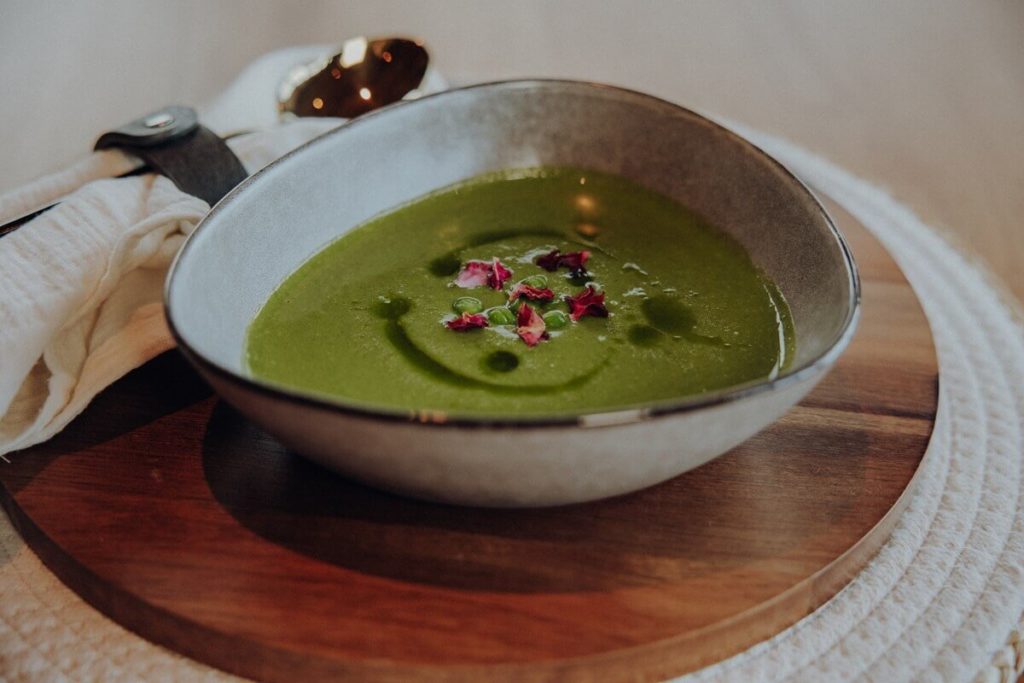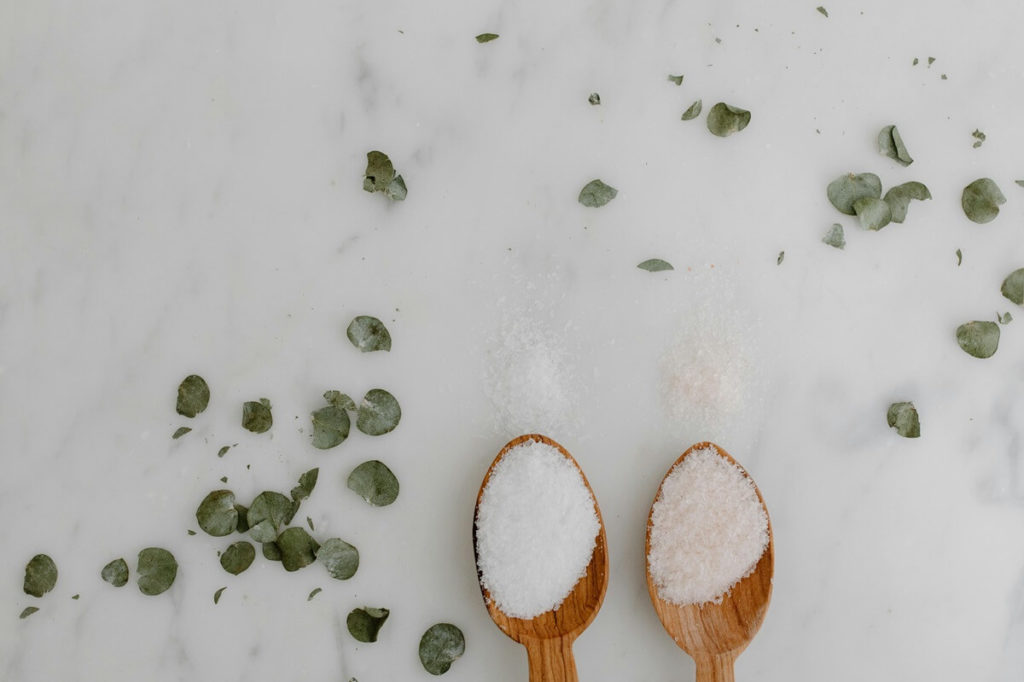The human gut does a lot of work every day. In addition to your metabolism, it also influences almost 80 percent of your immune system. A healthy intestinal flora is therefore essential for your entire organism. By cleansing the intestines, you can completely eliminate harmful bacteria and alleviate symptoms. You can find out how Ayurvedic colon cleansing works and how you can do it at home here.
Effect of Ayurvedic colon cleansing
With an Ayurvedic detox colon cleansing you increase your well-being and rid your body of waste products. It also alleviates chronic illnesses and can be used to treat acute complaints.
The physical complaints that can be treated particularly well with Ayurvedic colon cleansing include
- Allergies
- Headaches and migraines
- Irritable bowel syndrome
- Chronic digestive problems
- Weakened immune system
- Rheumatism
Colon cleansing or intestinal rehabilitation can also help with psychological complaints such as depressive moods, persistent exhaustion or sleep problems.
Why do an Ayurvedic colon cleansing?
The intestine is responsible for eliminating harmful bacteria. An unhealthy intestinal flora increases the risk of illness.
The cause and problems lie in the inner wall of the large intestine. Bacteria or metabolic residues - also known as 'ama' in Ayurveda - accumulate there. The greater the number of toxins deposited, the easier it is for diseases to take root.
With an Ayurvedic colon cleansing or colon detox and a healthy diet, you can protect your intestines and prevent illness in the long term.


An Ayurvedic intestinal detox is also recommended if you have no acute complaints. The results after a complete detoxification are immediately noticeable. You feel lighter and have more energy again.
Intestinal cleansing and rehabilitation in Ayurveda
In Ayurveda, a distinction is made between colon cleansing and colon rehabilitation. Colon cleans ing is a short-term process in which you detoxify your colon with the help of home remedies.
Intestinal cleansing, on the other hand, combines various measures and is used as a longer-term cure. This can take several weeks or months and makes sense if your gut is particularly weakened. It is best to undergo a cleanse in the experienced hands of Ayurveda experts at a resort.
How does an Ayurvedic colon cleansing at home work?
You can use Ayurveda in different ways to cleanse your intestines. In the classic Ayurvedic fasting cure (Panchakarma cure), you largely abstain from solid food. This means that the intestines have to do very little work and can regenerate better.


Discover the 7-day Panchakarma cure for at home now
In our book "Ayurveda: The 7-day Panchakarma cure for at home", our experts show you how you can gently detoxify in 7 days.
Another option is the active colon cleansing cure, which is called 'Shankprakshalana' in Ayurveda.
The most important thing is that you take plenty of time for a colon cleansing. The activities in the bowel often only become noticeable after hours or even days. Your body also needs energy during this time and therefore needs more rest.


During the cleansing process, your intestines flush out, causing you to lose a lot of fluid. To counteract this, you should ideally drink two to three liters of warm water per day. Your body needs even more fluid if you cleanse with Epsom salt.
The right diet for Ayurvedic colon cleansing
The ayurvedic diet plays a major role in achieving the best possible result from your treatment. In addition to active exercises, the right foods support your intestinal detoxification.


Vegetables and pulses in particular, as well as the following alkaline foods, have a positive effect:
- Apples
- Pears
- Rocket
- Endive salad
- Broccoli
- Almonds
- Mushrooms
- Vegetable juices
- Green tea
- Amalaki
Bitters are a great support for Ayurvedic colon cleansing. In the morning, you can drink a glass of warm water with lemon juice, honey and ginger on an empty stomach. The mixture stimulates your metabolism and has a long-term positive effect on you and your intestinal flora as a daily routine.
Ayurvedic recipes for your gut health
With the right recipes, you can do a lot for your well-being and intestinal health. The following inspirations have a positive effect on you and your body, both as a supportive measure and as a preventative measure.


Recipe #1: Ginger water
Ginger helps to purify and detoxify your body. It promotes digestion and stimulates the metabolism as well as the digestive fire 'Agni'. It is best to drink the ginger water lukewarm throughout the day.
| Ingredients: | Preparation: |
| - 4 slices of fresh ginger - 1 liter of boiling water | - Wash the ginger and cut into thin slices. - Then bring to the boil briefly in water. - Remove the pan from the heat and leave to infuse for approx. 15 minutes. |
Recipe #2: Kitchari
Kitchari is a light stew made from mung beans and rice that is rich in nutrients and protein. If you are doing an Ayurvedic colon cleanse, you can eat the dish up to three times a day. The recipe is suitable for all three dosha types.
| Ingredients: | Preparation: |
| - 1 cup green mung beans - 1 cup basmati rice - 3 tsp ghee - 1 tsp cumin, whole - 2 bay leaves - 1 tbsp fresh ginger, grated - 1 pinch asafoetida powder - 1 tsp turmeric - 3 green cardamom seeds - 1 tsp peppercorns - 1 pinch salt - 8 cups water - vegetables as desired, approx. a handful (e.g. carrots) | - Soak the mung beans in water overnight so that they are covered. - Crush the pepper, cardamom and cumin seeds in a mortar. - Heat the ghee in a pan and add the cumin seeds. After frying briefly, add the remaining spices. - Stir in the mung beans, rice and salt, deglaze with 8 cups of water and bring to the boil briefly. Reduce the heat and simmer for about 40 minutes with the lid on. - After 20 minutes, add the remaining vegetables, e.g. carrots. - Remove the bay leaves before serving. |
Recipe #3: Probiotic lassi
Lassi has a cooling effect on your body and aids digestion. Lassi also opens up fine orifices, which leads to more freshness and energy. The basic recipe can be refined or expanded as desired.
| Ingredients: | Preparation: |
| - 1 cup of yogurt - 4 cups of lukewarm water - Spices to taste (e.g. cinnamon) | - Mix both ingredients thoroughly with a mixer or whisk until the mixture foams. - Skim off the top layer of foam and filter the rest. A clean cotton cloth or a very fine sieve is best for this. - Then season to taste (e.g. with cinnamon) and enjoy. |


Ayurveda cookbook for at home
Discover the cookbook "Es geht mir richtig gut mit Ayurveda" for at home - with 60 simple and healthy recipes from the European Ayurveda Resort Sonnhof!
Natural remedies for bowel cleansing: Psyllium, Epsom salt and Glauber's salt
Ground psyllium seeds contain a large amount of digestive substances which, when absorbed together with water, swell up in the intestine. The increased food volume stimulates intestinal activity, which softens the deposits on the intestinal wall and allows them to be excreted more quickly.
You should not consume more than a maximum of 40 grams of psyllium. It is best to drink the mixture one to two hours before a meal. Pour water over a small amount of the psyllium husk powder and drink the glass as quickly as possible.
Although fast consumption contradicts the principle of Ayurveda, the seeds swell very quickly and become inedible.


Epsom salt binds the water in your intestines, which ensures softer bowel movements. Similar to psyllium, this also increases the volume of intestinal contents and stimulates intestinal activity. The effect sets in around one to three hours after ingestion.
There is no general rule as to how much Epsom salt you should take. It is best to try out whether one tablespoon is enough or whether you can take a little more. Simply dissolve the Epsom salt in warm water. Drink plenty of still water immediately afterwards, as the salt draws fluid from your body.
Glauber's salt is also dissolved in a glass of lukewarm water and then drunk in sips. You can dissolve up to four teaspoons of magnesium sulphate at a time.
Example of a daily plan for an Ayurvedic colon cleansing
For example, you can combine your diet and gentle exercise in this way.
Sample daily routine for an Ayurvedic colon cleansing at home:
| Recommended time of day: | Our recommendation: |
| 07:00 a.m. | Drink a large glass of lukewarm water with lemon juice, honey and ginger slowly and in sips. |
| 07:15 a.m. | First, light yoga exercises or a gentle abdominal massage. |
| 07:30 a.m. | Drink a second large glass of lukewarm water with salt. |
| 07:45 a.m. | Perform other gentle forms of movement. |
| 08:00 a.m. | Drink a third glass of water with Epsom salts. |
| 09:00 a.m. | Approx. 10-minute abdominal massage with plenty of massage oil. |
| 09:15 a.m. | Ayurvedic breakfast: For example, a warm, vegan porridge with apple and cinnamon. |
| 10:00 a.m. | Repeat your drinking regimen and yoga exercises (drinking, yoga, drinking, yoga, drinking) for the next hour. |
| 11:00 a.m. | Relax and rest before lunch. |
| 12:00 p.m. | Cook a fresh Ayurvedic lunch that promotes your bowel cleansing. |
| 1:00 p.m. | After the meal, we go for a digestive walk. |
| 2:00 pm | Time for another bowel cleansing with psyllium or Epsom salts. |
| 3:00 p.m. | Fresh fruit and freshly squeezed juice as well as nuts are ideal for small appetites. |
| 4:00 p.m. | Drink a cup of ginger water or lukewarm ginger tea. |
| 6:00 pm | Prepare an easily digestible dinner - ideally a light soup. |
| 21:00 | End your day with yoga and meditation and massage your feet with plenty of oil for about 10 minutes. |
| 22:00 | Before going to sleep, perform a final 10-minute abdominal massage as in the morning. |
Make sure you avoid stress during the time you are doing the colon cleansing. Stress has a negative effect on your energy levels and can impair the success of the treatment.
Procedure of a professional colon cleansing treatment
At the beginning of each treatment, a consultation with an Ayurveda expert takes place, in which important details about you and your health are clarified.
Based on this, an individual treatment and nutrition plan is then created for you. The results of the examination and your lifestyle habits and circumstances will be taken into account.


It will also determine your Dosha type is determined to bring the three doshas Vata, Pitta and Kapha into balance. This restores your vital energies.
Depending on which cure you take, you will receive one to three Ayurvedic treatments a day. The first few days begin with detoxification and cleansing of your intestines.
With the help of Ayurvedic colonic irrigations and enemas, your bowels are then emptied and cleansed from the inside. This releases toxins from your body and removes them via the gastrointestinal tract. This is accompanied by external treatments such as Ayurvedic massages and forehead oil infusions.
Taking special Ayurvedic herbs and spices is also helpful for an intestinal detox. These additionally stimulate cleansing and detoxification and strengthen you. As soon as your intestines are completely cleansed, the healthy rebuilding process begins.
Ayurvedic cures to cleanse your intestines
There are various Ayurveda cures and programsthat help you to cleanse your intestines and recharge your batteries.
- Panchakarma cureA profound treatment to cleanse the body, mind and soul. With the help of ghee, oil massages and scrubs, toxins are removed from your body. Your body flushes out the toxins on a detox day and you have new strength for the rebuilding phase.
- AyurDetox intensive cleansing: With the help of an internal cleansing, as well as full-body, stamp and herbal powder massages, your body is freed from toxins. This strengthens your immune system and restores your sense of well-being.
- Immune Power Cure: To build up your immune system, a combination of oil massages and yoga sessions will rebalance your gut and your doshas.
Preventing and alleviating intestinal complaints in Ayurveda
With the help of the Ayurvedic way of life, you can keep your body healthy in a natural way. This includes a healthy intestine without constipation, diarrhea or flatulence. In Ayurveda, there is a solution for every digestive problem that will help you to alleviate your symptoms.
Ayurveda for constipation
In the case of constipation, conventional medicine generally assumes that the "motility" of the bowel - known as intestinal motility - is too low. This is caused by poor diet, low fluid intake or too little exercise.
In Ayurveda, all these factors weaken the digestive fire 'Agni', which can no longer adequately digest the food you eat. As a result, your stomach remains constantly full because the digestive tract can no longer keep up with its task.
Ayurvedic foods and spices such as ginger and fennel are used to rekindle your agni. The waste products (ama) are also treated with special herbs.
Slags are metabolic waste products that are not removed by your body. From an Ayurvedic point of view, they are considered pathogens.
The following Ayurvedic remedies will help you with constipation:
- Aloe Vera
- Ginger
- Deepana (spices that stimulate agni such as cumin, mustard seeds or asafoetida)
- Ayurvedic herbs (Trikatu, Triphala)
- Bitter and hot spices
Ayurveda for diarrhea
If your intestinal contents are excreted faster than normal, this causes diarrhea, during which your body loses important salts, nutrients, digestive juices and, above all, water. The result is an increased risk of dehydration. Quick relief is needed here. Make sure you drink plenty of still water or unsweetened tea.
From an Ayurvedic point of view, diarrhea indicates that the digestive fire is too strong. The reason for this is poor utilization of food in the digestive tract. To counteract this, your agni must be reduced, which can be achieved with the following measures:
- Avoid solid food
- Fasting period from 24 to 36 hours
- Regular enemas
- Drink buttermilk, coconut water and rice bran
- Eat cooked rice, yogurt and nutmeg
These foods have proven to be helpful for diarrhea in Ayurveda:
- Ajwain water
- Barley water
- Whey
- Pomegranate peel powder
- Mangosteen
Ayurveda for flatulence
If an unusually large amount of air collects in your intestines, this causes bloating. This can be caused both by foods that promote flatulence and by hasty eating where you swallow too much air. The majority of intestinal gas is produced during the digestion process itself.
When stomach acid turns into carbon dioxide, this leads to a feeling of fullness or belching. Unused carbohydrates that ferment in your intestines or an intolerance to lactose can also lead to bloating. In this case, undigested sugar compounds enter the large intestine and ferment there.
Ayurveda works with nutritional principles and the right diet to combat flatulence. Take enough time to eat and avoid stress while eating.
The following foods also promote flat ulence:
- Onions
- Cabbage
- Beans
- Lenses
- Raw Food
- Unripe fruit
- Coarse wholemeal bread
- Baked in fat
Taking ginger, fennel and Piper longum (long pepper) helps with acute flatulence.
Ayurveda for irritable bowel syndrome
Irritable bowel syndrome is when gastrointestinal problems such as abdominal pain, irregular bowel movements or flatulence occur several times within a twelve-month period. Although irritable bowel syndrome is not dangerous from a medical point of view, it significantly restricts your quality of life.
In Ayurveda, a disturbance of Vata is considered to be the cause of irritable bowel syndrome, whereby the elements of air and space are combined. In Ayurveda, complaints with irritable bowel syndrome are counteracted by strengthening Vata and the digestive fire 'Agni'.
This requires comprehensive therapy, including changes or adjustments to your diet. This is the only way to resolve your symptoms in the long term.
Ayurvedic tips against intestinal complaints
In addition to Ayurvedic herbs such as ginger, fennel, aloe vera and cumin, a daily routine also makes a major contribution to a healthy gut. It is important that you never override your hunger and eat regular meals at roughly the same times.
Ayurveda does not recommend eating dinner later than 8 pm to ensure sufficient time for digestion before going to bed. Also make sure that you eat consciously and without stress. After eating, you should not drink anything for a while, but allow your bowels to rest.


A healthy diet is crucial for physical well-being and a healthy digestive tract. In Ayurveda, nutrition is adapted to the seasons and the respective condition of your body. This means cooking seasonally and preferring light food in summer, while you can eat more hearty food in winter.
Possible side effects before recovery
To a certain extent, a colon cleanse is a change for your body. A lot is happening inside you and your body has to deal with it first. This can lead to a so-called "detoxification crisis". Possible side effects are
- Headache
- Lack of energy
- Constipation
- Bad breath
- Increased perspiration
Ayurvedic colon cleansing can therefore initially lead to side effects before the symptoms improve.
It is almost impossible to predict possible side effects because every body is unique and reacts differently to cleansing. In Ayurveda, however, the following generally applies to intestinal detoxification: your body reacts in its own way because it is an individual system.


Detox at Sonnhof: cleanse body, mind and soul
Many of our guests want to shed old baggage and cleanse their body, mind and soul from the inside out. A detox at the Sonnhof is perfect for this. We'll show you what a detox cure at our hotel looks like.






